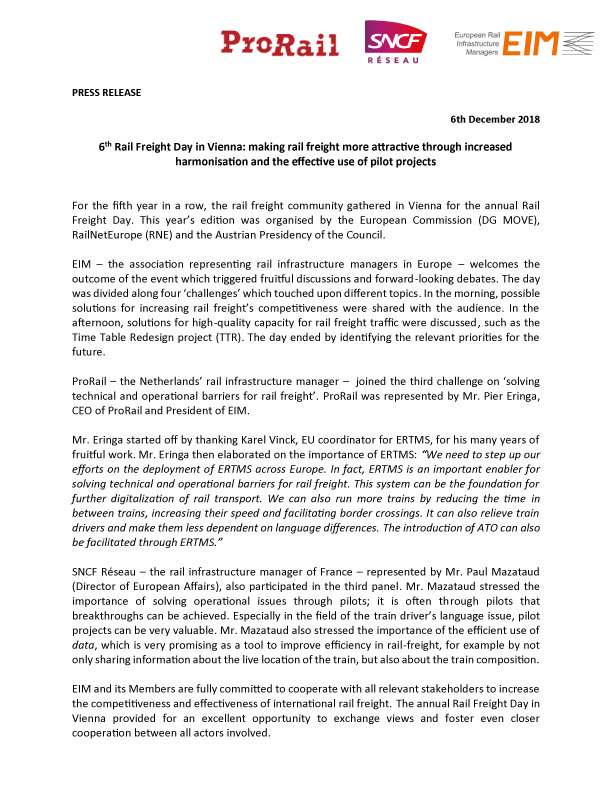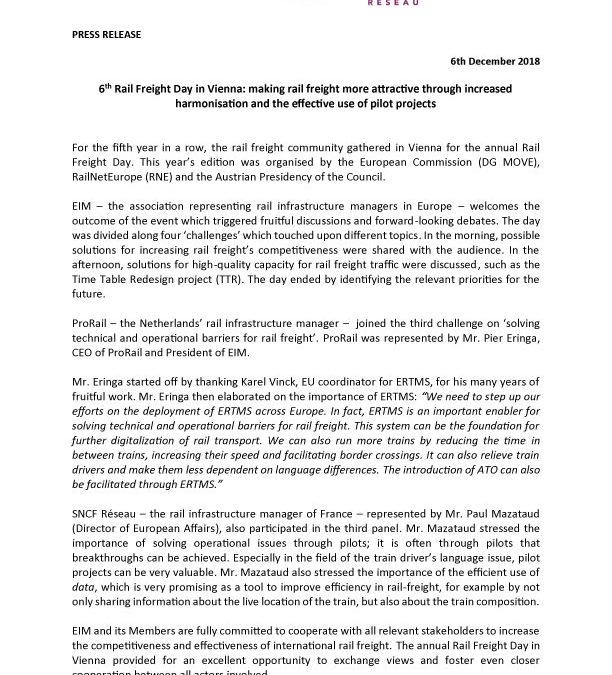Press Releases
For the fifth year in a row, the rail freight community gathered in Vienna for the annual Rail Freight Day. This year’s edition was organised by the European Commission (DG MOVE), RailNetEurope (RNE) and the Austrian Presidency of the Council.
EIM – the association representing rail infrastructure managers in Europe – welcomes the outcome of the event which triggered fruitful discussions and forward-looking debates. The day was divided along four ‘challenges’ which touched upon different topics. In the morning, possible solutions for increasing rail freight’s competitiveness were shared with the audience. In the afternoon, solutions for high-quality capacity for rail freight traffic were discussed, such as the Time Table Redesign project (TTR). The day ended by identifying the relevant priorities for the future.
ProRail – the Netherlands’ rail infrastructure manager – joined the third challenge on ‘solving technical and operational barriers for rail freight’. ProRail was represented by Mr. Pier Eringa, CEO of ProRail and President of EIM.
Mr. Eringa started off by thanking Karel Vinck, EU coordinator for ERTMS, for his many years of fruitful work. Mr. Eringa then elaborated on the importance of ERTMS: “We need to step up our efforts on the deployment of ERTMS across Europe. In fact, ERTMS is an important enabler for solving technical and operational barriers for rail freight. This system can be the foundation for further digitalization of rail transport. We can also run more trains by reducing the time in between trains, increasing their speed and facilitating border crossings. It can also relieve train drivers and make them less dependent on language differences. The introduction of ATO can also be facilitated through ERTMS.”
SNCF Réseau – the rail infrastructure manager of France – represented by Mr. Paul Mazataud (Director of European Affairs), also participated in the third panel. Mr. Mazataud stressed the importance of solving operational issues through pilots; it is often through pilots that breakthroughs can be achieved. Especially in the field of the train driver’s language issue, pilot projects can be very valuable. Mr. Mazataud also stressed the importance of the efficient use of data, which is very promising as a tool to improve efficiency in rail-freight, for example by not only sharing information about the live location of the train, but also about the train composition.
EIM and its Members are fully committed to cooperate with all relevant stakeholders to increase the competitiveness and effectiveness of international rail freight. The annual Rail Freight Day in Vienna provided for an excellent opportunity to exchange views and foster even closer cooperation between all actors involved.



